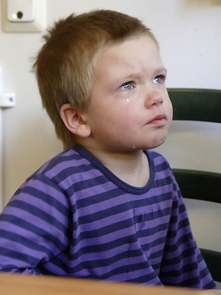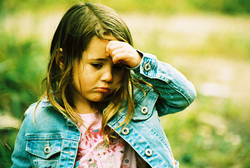|
Sheryl Isaacs is a Licensed Marriage and Family Therapist. She is currently working in Scotts Valley seeing clients in private practice.
Sheryl has worked with families and children that have experienced a wide range of issues including: anxiety, trauma, depression, autism, ADHD, developmental issues, behavioral issues, divorce, bulimia, grief, communication and self esteem issues. She provides parental coaching, child therapy, sibling counseling, family therapy, marriage counseling, and individual counseling. AuthorArchives
March 2020
Categories
All
|
Back to Blog
Part Two: Domestic Violence and Children9/11/2013
The Importance of Attachment for Children When children are born the most important developmental task that they face is being able to attach to their primary caregiver. It is this attachment that lays the foundation for children to be able to develop socially and emotionally in early childhood. Children learn what to expect from their environment, how they should be treated and what relationships look like from their primary caregivers. Every time that a newborn is held and attended to when crying the child is learning to trust their environment and learning to build relationships. Attachment to parents provide infants and children with a sense of security, help the infant in developing affect regulation, build communication and help the infant/child have a secure base to feel safe and explore their environment. As parents we can attach in three negative ways to our children. The way that we attach affects how our child will function in the future, their rate of development and how they relate to others. This attachment that we give to our child can change due to trauma and stressors in the immediate family. Avoidant attachment occurs when children's needs are dismissed, when their behavior is thought of as purposeful to cause problems for the parent, and the child is thought of in a negative light by the caregiver. Children that have this style of attachment are more aggressive, experience negative interactions with other children, and tend to sulk and withdraw. The negative behaviors and interactions cause a negative view of the child for peers and teachers which reinforce the child's belief that they are a "problem." Ambivalent/Resistant Attachment occurs when a parent is not consistent in their response to their child. The parent may respond to needs in one instance then ignore the child or become angry in another. These children learn to read their parents behavior and mood. They have a strong desire to have consistent attachment and focus on trying to attain this. This stifles their interest in exploration of the world around them and stifles their development. Disorganized/Disoriented Attachment occurs when the child sees the parent as someone to fear. These children can become highly controlling and very aggressive toward peers. Due to not receiving love and nurturing their self-esteem is low and they face difficulty in school. Many parents that attach to their children in this way have experienced trauma in their own childhoods. Attachment is an interactive and reciprocal process that involves the "space in between" the caregiver and the child. Tone of voice, rhythm of voice, eye contact, voice modulation and body movement help caregivers create a safe reciprocal environment for their child to respond and grow in the relationship. In a secure attachment the parent is in tune to the child and responds to wants and needs that the child expresses. They are able to "follow the child's lead." If the child cries the parent is aware of what the cry means and is able to respond in a nurturing manner to meet that need. They are aware of when their child needs space or is overstimulated and can adjust the environment accordingly. In a domestic violence (DV) household there is high anxiety, anger, feelings of being overwhelmed or "walking on eggshells." There is depression and hopelessness that is experienced by the caregiver. These strong feelings are felt and experienced by the children in these homes as well. Caregivers that experience such strong emotion are unable to be present to meet their children's needs. Survival for the caregiver consumes their energy and the children suffer the consequences of living in a home that has DV. How Domestic Violence Affects Children When children live in a home that has domestic violence they are experiencing trauma. It does not matter if the child experiences the DV firsthand or witnesses the DV happening to another family member. A child that lives in a home with any form of DV is affected in a negative manner. When stress is experienced there is an increase in cortisol within our body. This is true for adults and children. When DV occurs repeatedly toxic stress is experienced. When toxic stress occurs we are essentially bathing our brain in cortisol. This also occurs to a child while they are in the mother's womb. If a mother experiences high levels of stress their cortisol passes the placental barrier and the child is affected. This increase in cortisol causes physical, emotional, psychological, social and behavioral changes within a child. Studies have shown that children that experience repeated trauma/toxic stress show a smaller than average brain size compared to peers that have not experienced this repeated trauma. Cognitive function is impaired and children experience difficultly with tasks that require memory. There is a noticeable decline in attention span and ability to focus. It is difficult for these children to regulate themselves or self-soothe. These children are "on edge" and experience a heightened startle response. Children that are living in a DV environment experience higher amounts of fear in regard to their environment. Their basic sense of safety and trust is undermined by the out of control feeling they experience within the home environment. They too, experience helplessness and depression. Children internalize blame and blame themselves for the DV that occurs in the home. They feel that it is something that they did or did not do that caused the DV. They can experience problems sleeping, act out aggressively or regress in their behaviors. Children are not able to function at school and may not want to go to school. At times, they may feel that if they are with the abused parent they can in someway prevent the abuse. If children do go to school they are not able to concentrate and learn due to fears of what is happening at home. Children may be labeled as ADHD due to inability to concentrate, behavioral issues at school and issues socially with other children. The affects of DV last a life time and set the child up to repeat the DV cycle with their own children. If our children form a negative attachment to us then they will not be prepared to attach to their children in a positive manner. DV sets up generations to be affected in negative and damaging ways. It is important that if you experienced DV within your childhood that you work through your trauma. We can only parent how we learned to parent. If our parents were unable to attach to us in a healthy manner, we will be unable to attach to our children in a healthy manner. It is important to recognize the unhealthy pattern and break the cycle. Counseling can help you learn how to strengthen the attachment you have with your child and build a secure bond that can affect future generations of your family in a healthy way. If you are in a DV relationship seek help to find support to make sure that you can get out of the relationship safely. Walnut Women's Center 24 Hour help line 866-269-2559 Defense de Mujeres 888-900-4232 Women's Crisis Support 685-3737 Provides emergency shelter for DV and sexual assault victims DV Hotline 800-799-SAFE |
- Therapy for Your Family
- About Me
- Child Therapy
- Family Therapy
- Forms for Therapy Scotts Valley and Santa Cruz
- Therapy Articles for your Children and Family
- Sensory workshop for Parents and Children, Scotts Valley
- Kindergarten Readiness Toolkit
- Free worksheets for therapy
- Resources for Families in Scotts Valley and Santa Cruz
- Scotts Valley Therapist will be out of office
- Groovy Gifts by Sheryl
- Groovy Tie Dye Shirts
- Groovy Gifts Tie Dye Special Order
- Groovy Gifts Tie Dye Shirts
- Groovy Gifts Jewelry
- Child and Family Therapist Insurances Accepted
- Give Away June 20232
- Therapy for Your Family
- About Me
- Child Therapy
- Family Therapy
- Forms for Therapy Scotts Valley and Santa Cruz
- Therapy Articles for your Children and Family
- Sensory workshop for Parents and Children, Scotts Valley
- Kindergarten Readiness Toolkit
- Free worksheets for therapy
- Resources for Families in Scotts Valley and Santa Cruz
- Scotts Valley Therapist will be out of office
- Groovy Gifts by Sheryl
- Groovy Tie Dye Shirts
- Groovy Gifts Tie Dye Special Order
- Groovy Gifts Tie Dye Shirts
- Groovy Gifts Jewelry
- Child and Family Therapist Insurances Accepted
- Give Away June 20232
- Therapy for Your Family
- About Me
- Child Therapy
- Family Therapy
- Forms for Therapy Scotts Valley and Santa Cruz
- Therapy Articles for your Children and Family
- Sensory workshop for Parents and Children, Scotts Valley
- Kindergarten Readiness Toolkit
- Free worksheets for therapy
- Resources for Families in Scotts Valley and Santa Cruz
- Scotts Valley Therapist will be out of office
- Groovy Gifts by Sheryl
- Groovy Tie Dye Shirts
- Groovy Gifts Tie Dye Special Order
- Groovy Gifts Tie Dye Shirts
- Groovy Gifts Jewelry
- Child and Family Therapist Insurances Accepted
- Give Away June 20232
|
Groovy Gifts by Sheryl
Many hand crocheted items that are unique and personal, one of a kind gifts. Groovy Tie Dye, Sarcastic Stuffies, Groovy Pets, Therapy Rocks, Groovy Totes and Tie Dye T-shirts. Also sensory toys, fun toys, therapeutic toys. Online Store! |
Services Provided
-Child Therapy -Family Counseling -Marriage Counseling -Parental Coaching -Sibling Counseling |
Focus
-Parenting Struggles -Anger MGT -Depression -School Problems -Grief and Loss -Effects of Divorce -Child Anxiety -Your Anxiety -Co-parenting Strategies -Communication -Sibling Rivalry -Resources for Early Intervention -Coping with Developmental Delays -Perinatal Loss -Miscarriage |
What Clients are saying:
Sheryl has helped me with my children's challenging behavior. She has been very helpful with support for me and my children. She has provided me with tools and resources that have help me be a better parent and partner. I strongly recommend her to anyone who is facing difficulties in their relationships. -Yelp Review Sheryl lets me feel totally understood and cared for... I feel unconditional acceptance and heard by Sheryl. |
Copyright 2013, Sheryl A. Isaacs , ALL RIGHTS RESERVED

 RSS Feed
RSS Feed
